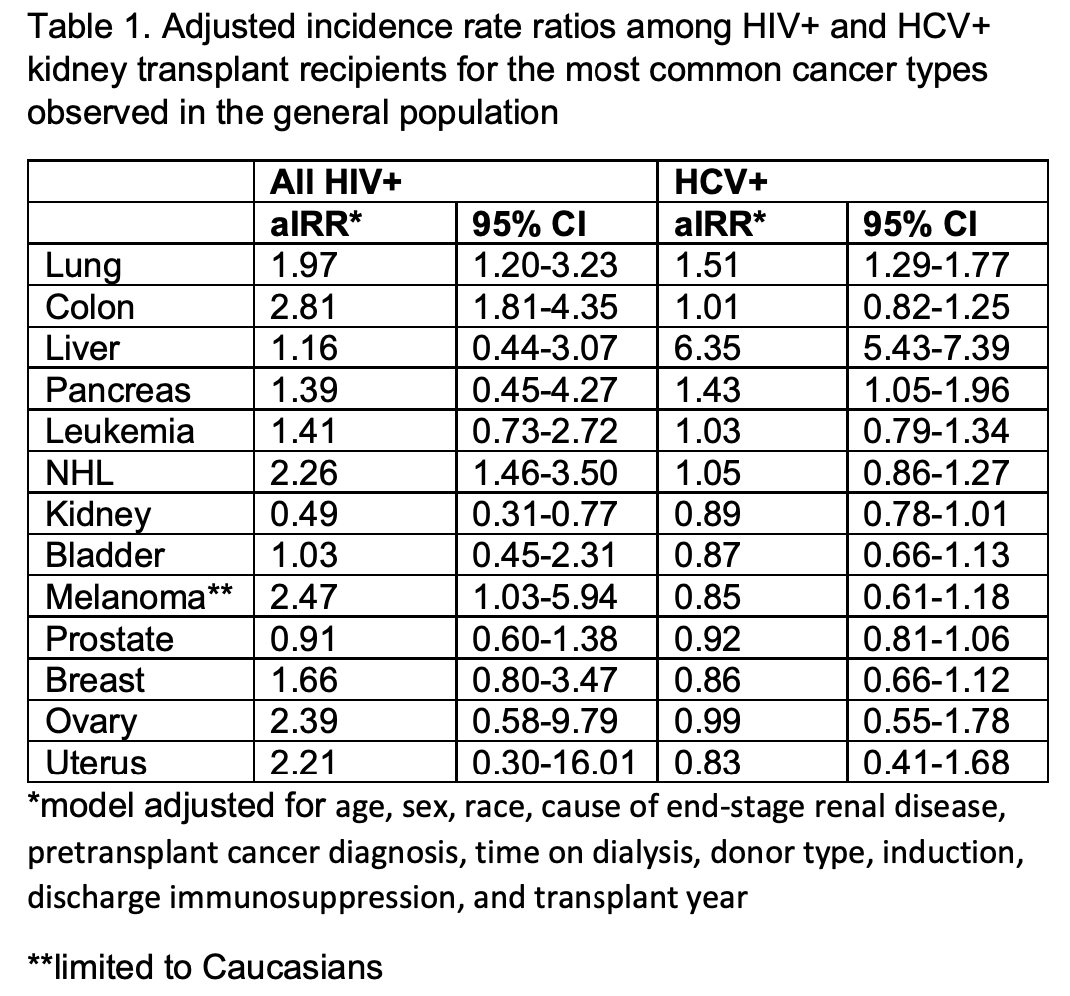Posttransplant Malignancy in HIV+ Kidney Transplant Recipients
D. Sawinski1, R. Fitzsimmons1, J. Locke2, J. Trofe-Clark1, B. Shelton2, P. Reese1, E. Blumberg1
1Hospital of the University of Pennsylvania, Philadelphia, PA, 2University of Alabama at Birmingham, Birmingham, AL
Meeting: 2021 American Transplant Congress
Abstract number: 158
Keywords: HIV virus, Malignancy
Topic: Clinical Science » Infectious Disease » Kidney Infectious Non-Polyoma & Non-Viral Hepatitis
Session Information
Session Name: Infections in Kidney Recipients
Session Type: Rapid Fire Oral Abstract
Date: Sunday, June 6, 2021
Session Time: 6:00pm-7:00pm
 Presentation Time: 6:00pm-6:05pm
Presentation Time: 6:00pm-6:05pm
Location: Virtual
*Purpose: Kidney transplant recipients and people living with HIV are both at increased risk for malignancy, including cancers that are virally-mediated. Despite the recognition of malignancy as an important contributor to mortality in both populations, the impact of HIV and kidney transplantation together on post-transplant cancer rates has not been systematically studied.
*Methods: We linked data from the OPTN/UNOS and USRDS to assemble a cohort of first kidney transplant recipients from 1/1/01-12/31/16 who had Medicare Part A and B claims. Using ICD-9 codes, we identified cancer outcomes via validated cancer claims from Medicare data. We used Poisson and negative binomial regression to estimate post-transplant malignancy adjusted incidence rate ratios (aIRR), by HIV and HCV sersostatus. HIV+ and HIV+/HCV+ patients were combined for analysis to improve power. Cancers were considered both individually and in groups: epithelial (breast, prostate, colon, ovary, trachea/bronchus, lung); HPV-related, tobacco-related, and infection-related.
*Results: We identified 135,702 HIV-/HCV-, 6781 HCV+, 815 HIV+ and 203 HIV+/HCV+ recipients who met study criteria. 25.3% of the cohort overall had a post-transplant cancer-related Medicare claim and the median time to a cancer claim was 4.9 (1.9-8.9) years after transplant. HIV+ recipients had elevated rates of epithelial (aIRR 1.41, 95% CI 1.10-1.81), HPV (aIRR 4.03, 95% CI 2.59-6.26) and tobacco-related cancers compared to HIV-/HCV- or HCV+ recipients. Infection-related cancers were increased in both HIV+ and HCV+ recipients. Among cancers most prevalent in the general population, HIV+ recipients had elevated rates of lung and colon cancers, as well as melanoma and Non-Hodgkin’s lymphoma (Table1).
*Conclusions: HIV+ kidney transplant recipients experience rates of many cancers that are elevated beyond rates expected due to transplant alone. Post-transplant screening efforts in HIV+ recipients should focus on lung, colon and skin cancer screenings in addition to HPV-related malignancy surveillance.
To cite this abstract in AMA style:
Sawinski D, Fitzsimmons R, Locke J, Trofe-Clark J, Shelton B, Reese P, Blumberg E. Posttransplant Malignancy in HIV+ Kidney Transplant Recipients [abstract]. Am J Transplant. 2021; 21 (suppl 3). https://atcmeetingabstracts.com/abstract/posttransplant-malignancy-in-hiv-kidney-transplant-recipients/. Accessed March 4, 2026.« Back to 2021 American Transplant Congress

